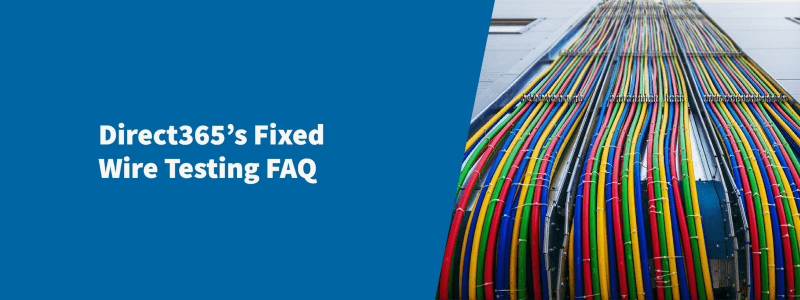Electricity. It keeps us going by powering facilities from general lighting to complex appliances.
Behind the flick of a switch is a circuit board that keeps everything working right. This is where fixed wire testing comes in handy, keeping these boards in good working order.
Fixed and Portable Wires – What’s the Difference?
Let’s begin with the primary differences. Fixed wire testing is not the same as portable appliance testing (PAT), even though they both test electrics.
It’s spelt out in the name: a fixed wire relates to the bare essentials of your buildings power and electricity circuit. These wires are fixed.
Portable electrics, however, include things like phone chargers or laptops – if it’s an electrical device that you can carry, then PAT is the relevant way to test. Have a look at our guide here to find out what devices need testing and when.
Why do you Need Fixed Wire Testing?
Damaged or frayed wires can lead to a range of incidents, including power outages, electrocution and fire. The HSE recommend an initial visual inspection of the electrical equipment to look for faults such as:
- Burn marks or staining, which suggests the equipment is overheating
- Damaged electrical cables (new cables must be replaced by a qualified professional)
All fixed electrical wiring deteriorates with time, so you need to regularly test your entire electrical distribution system to ensure it’s safe and compliant. Failure to do so may put your business at risk of prosecution.
The required frequency of fixed wire testing depends on the environment, typically ranging from every 3 months to annually. Make sure you check the recommendations for your specific conditions.
Along with the compliance side of things, you want to avoid power outages. or dangerous conditions for your employees, customers or visitors.
As part of your business’s Duty of Care obligations, regular electricity testing is crucial to keep your premises, your staff and your customers safe.
Is Fixed Wire Testing a Legal Requirement?
Fixed wire testing comes under the Health and Safety at Work Act (1974) requiring employers to make their premises safe for staff and visitors alike.
Fixed wiring also features in the Electricity at Work Regulations (1989), which states that any electrical equipment that could present a personal injury must be properly inspected and tested.
So, yes, it is a legal requirement. As part of your business’s Duty of Care obligations, regular electricity testing is crucial to keep your premises, your staff and your customers safe. This is why it’s important to use an accredited supplier who’ll provide legal paperwork to prove your business’s compliance.
What Does Fixed Wire Testing Involve?
Fixed wire testing covers various electrical systems and installations within a building. When an engineer comes to test your wires, faults are categorised as:
- C1 – these are the most dangerous types of faults which require immediate action, they are repaired on site before contractor leaves
- C2 – these faults require attention but aren’t an immediate danger
- C3 – for these faults, improvements are suggested as an advisory
An electrical installation condition report (EICR) is issued post-inspection. This is a document to certify the condition of your building’s electrical wiring, circuits, accessories and connections.
It’s recommended to have fixed wire testing carried out of hours to avoid disruption of business, as it requires testing all electronics and circuitry within the building.
Choose Direct365 for Your Fixed Wire Testing
It’s difficult finding the best person for the job, especially when you need the work carrying out in a fast and reliable manner.
We find the best expert engineers for the job by getting to know your requirements, location and availability. We provide a service that ensures that your business stays safe and fully compliant with all legislation.
For all your electrical inspection needs, get a free, no-obligation quote today!

